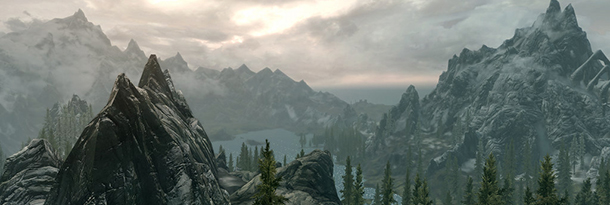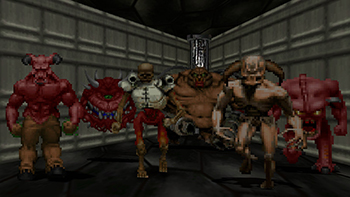4 Things Gamers Think Are Important (But Aren't)

I know what I want in a video game. I want a smart story, innovative gameplay, and to be challenged intellectually. At least, I thought that's what I wanted. But then I played the new DOOM, which had none of that, but was also the most fun I've had in front of my TV in years.

I'm not sure if you've heard, but this is a thing you can do in that game.
That's when I realized that I don't actually have the faintest damn clue what I want in a game. And what I think I want is actually just a bunch of malarkey. Also: I'm bringing back "malarkey." It's a good word.
Absolute Freedom (Means There's Nothing to Do)

What We Think We Want
Freedom, baby. Ya feel me? More than just a word for the type of radiation given off by the American flag, "freedom" is the greatest thing that a video game can offer you. In real life, we're trapped in stupid human society, with stupid "laws" and petty "physical consequences for our squishy human bodies" preventing us from fulfilling our deranged fantasies. But in video games, anything is possible. That's why the best games are stuff like Grand Theft Auto and Minecraft -- ones that don't even tell you what to do. They just point at the world and say, "All yours, my child. All yours. Also, here's a machine gun."
And hey, did you hear about this No Man's Sky game? It's like that, but with an entire universe! There's so much goddamn freedom in that game that anyone who goes near it becomes riddled with malignant patriotic tumors. That much freedom guarantees it'll be awesome, right?
The Reality
Not to sound like a conspiracy theorist, but "freedom" in a video game is a lie, man. You're only ever doing what the video game was programmed to allow you to do, man. And that's always how it is.
For example, take Grand Theft Auto. You can't do "anything" -- you can do the violent, hyper-masculine activities the designers remembered to program. That may be fun as hell, but it's still not "freedom." Even Minecraft, which seems like the purest sandbox game possible, still only lets you mine and repurpose materials into your own creations. You can't, say, try to sustainably coexist with nature. There's no granola-munching hippie lifestyle in Minecraft. And these limitations, it turns out, are what make the game fun. If you don't give us direction, we get sorta lost.
For proof, look at the saga of No Man's Sky. It's a game about exploring space, and when they debuted a trailer at E3, everyone lost their goddamn minds over it, as I did above, because of all that sweet, intoxicating freedom. The main hook was that there were nine quintillion planets to explore, and you could go anywhere and do anything. It seemed pretty damn neat. But then it came out, and everyone was so horribly disappointed that fans dubbed it "No Man's Lie," and demanded refunds (and in many cases, received them). What was the problem? Were there only two quintillion planets? Were all the planets the same? Did the game just straight up not work?

Was it this guy?
No, nothing like that. The problem was that multiplayer didn't work, and a lot of the aliens you met were kinda boring. The nine quintillion planets, the space travel, that was all there. In fact, No Man's Sky does absolutely everything it promised from the beginning; everything that made us excited to play it in the first place. It's just that exploring an infinite video game universe -- the very thing that we got so excited about in the first place -- is super boring if there isn't anything to do. This is why we defunded NASA in real life, it turns out. Exploring is boring. Freedom, it turns out, isn't enough. Gamers need tasks. We need you to tell us to do something. We want you to make us think we're free, when we're actually doing exactly what you want. That was the message of Bioshock, right?
We Want Movie-Quality Stories (As Long As They Don't Get In The Way Of Our Murder Fantasies)

What We Think We Want
Look, I don't just play video games because they're hyper-violent fantasies or because I'm afraid of the mosquitoes and loud noises that are outside. I play them because of their great stories. Stories like in The Last Of Us or Bioshock or Spec Ops: The Line. See? This is a real medium. Shakespeare would've probably written video games if he were alive now, I bet. For sure.
The Reality
The reason video games don't have great stories is that they're games. Games are different from stories. The first goal of a video game is always to be fun, but somewhere along the line, we decided that the only way to have games be taken seriously is to give them Serious Stories. So we decided to splice in cutscenes -- whole chunks of the game in which instead of "playing," we're watching a CGI movie. This is the equivalent of playing chess with your friends, but taking five minutes before your turn to explain the motivation of your rook, and the tragic injury in his youth that prevents him from moving diagonally.

"My father looked up at me, and with his dying breath, whispered, 'Never move diagonally.' I am a talking parapet."
I remember loving The Last Of Us's story, but when I think back on it, I realize that the story kept being hurt by the fact that it also had to be a game. In the beginning, Joel and his buddy ruthlessly murder like 50 dudes in the middle of a town, but we're still supposed to see him as a relatable hero. We're also supposed to be worried about Ellie, even though she's invincible through all the gameplay, because otherwise that'd be irritating. The game I played and the story I was following were happening in two totally different worlds, so I kept having to switch.
That's when I realizes that there are the three types of "great video game stories."
1. Thesis statements on the nature of video games (Bioshock, Spec Ops: The Line)
2. Several dozen cool, loosely related ideas, scattered around a map for you to discover on your own (Fallout, Oblivion, Dark Souls)
3. Something that would work better as a movie (The Last Of Us)
Calling this stuff "stories" is the same simplistic, reductive thinking that leads game designers to throw in random references to sexual violence because they think it's mature. Games don't need to be movies. They can be games. They are games! Stop trying to make them something else! Why am I shouting at myself!?
Cutting-Edge Graphics (Don't Matter)

What We Think We Want
The first thing you notice when a video game trailer hits are the "sweet new graphics," which is what my friends and I used to say to each other when we were kids, and oh god I hope that doesn't date me too much. For as long as I remember being alive (which, I repeat, is a non-specific length of time), we've been chasing that dragon of the photorealistic game. Apparently without really thinking about what it's going to be like to shoot photorealistic people with photorealistic rifles.

Pokemon Alpha Sapphire Ruby Ultron: Now with anatomically correct blood and injury effects!
The Reality
Graphics don't matter! To anybody! And I know this is true, because as I covered in 2012, games use stereotypes as gameplay mechanics.
Again, it's not because gamers are racist. (You get in trouble if you don't say this every few sentences when discussing video games. Nobody really knows why.) It's because racism just happens to sync up with good game design really well. When we're playing a shooter, for example, we need to be able to immediately identify our enemies or our friends or power-ups at a glance. That's why a well-designed game has monsters that have immediately identifiable silhouettes:

And why power-ups are always in friendly colors:

The important part of game design isn't "rich, evocative details" or "realistic sweat stain mechanics." We're only noticing that stuff if we stop playing the game for a few seconds, sit right next to our TV, and consciously pick it out. That has nothing to do with gameplay, and gameplay is why we bought the game, and not a Jackson Pollock print to stare at while scarfing pizza bagels and energy drinks.
So sure, the technology is important, and the leaps forward in technology have made more types of games possible. But the fine detail? The "sweet graphics?" We all stopped noticing them five minutes after we picked up the shotgun.
We Want The Devs To Not Be Involved In The Games

There were two recent gaming stories that, though they might seem totally different, are actually examples of the exact same attitude that gamers have developed.
First, let's talk about No Man's Sky again. Putting everything else aside, the idea of a procedurally generated universe is ... pretty damn rad, right? The developers basically made an algorithm for animal and terrain design, and then the game -- at least, the parts that we see and play -- designed itself. It's a mystery to both them and us that we got to discover together. Neat ... right?
Then there was an interview about Deus Ex: Mankind Divided, a game that is set in a world with apartheid, but instead of between whites and blacks, it's between humans and "augs" -- technologically augmented humans. When asked how the game approaches this racism parable, the designer said, "We never say in the game if we're on one side of the debate or another .. If you think they deserve it, that's perfect. If you don't think they deserve it, that's perfect." That's ... pretty cold. But it's at least true to the spirit of gaming, right? Everything's in our hands. The gamers have the power to decide.
The Reality
The weird thing is that in both those cases, we're excited that the game developers aren't involved in their own goddamn game.
I'm not going to get into whether or not Deus Ex is racist for giving us the opportunity to support apartheid. Instead, I want to ask a simpler question: Why would I, or anyone, want that? Why would I want a game to just stick a parable for racism up on my TV screen, then pull back and say, "Hey, I'm not saying if it's good or bad. That's for you to decide." What? Why the fuck did you bring up Black Lives Matter if you don't have anything to say about it? Imagine how weird that would be if, at a party, your buddy Chaz was like, "Hey, Black Lives Matter, huh? I mean, I'm not gonna tell you my opinion. Just 'Black Lives Matter.' It exists." That'd be weird. Stop being weird, Chaz. Stop being weird, Deus Ex: Mankind Divided.

I'll believe that this banner is just a "coincidence" right after I believe the next thing Peter Molyneux says.
It's the same with No Man's Sky. Why were we so excited to hear that a computer designed every planet and every spaceship that we'd see in the game? Design is hard, man. I can't do it. That's what I'm paying the game developers for: Something they made. Something that has the marks of human effort on it. If I'm going to spend my gaming time exploring a planet, I want someone to have spent the time and effort to make that planet cool and fun to explore. And if I'm going to play a video game about freaking racism, I want the game to say something about it instead of just stating that it exists. Because otherwise, man, this is all just a bunch of malarkey.
JF Sargent is a senior editor and columnist for Cracked. Follow him on Twitter and Facebook.
For more things that probably never dawned on you, check out 4 People Who Are Only Famous Because We All Despise Them and 5 Mistakes You Will Make When You Try To Eat Healthy.
Subscribe to our YouTube channel, and check out What Your Favorite Video Game Says About You, and other videos you won't see on the site!
Also, follow us on Facebook, and be the Luigi to our Mario.
Every year we're inundated with movies that are based on true stories. We're about to get a Deepwater Horizon movie where Mark Wahlberg will plug an oil spill with his muscles, and a Sully Sullenberger movie where Tom Hanks will land a plane on the Hudson with acting. But we think Hollywood could do better than this. That's why Jack O'Brien, the Cracked staff and comedians Lindsay Adams, Sunah Bilsted, Eli Olsberg, and Steven Wilber will pitch their ideas of incredible true stories that should be made into movies. Get your tickets for this LIVE podcast here!





